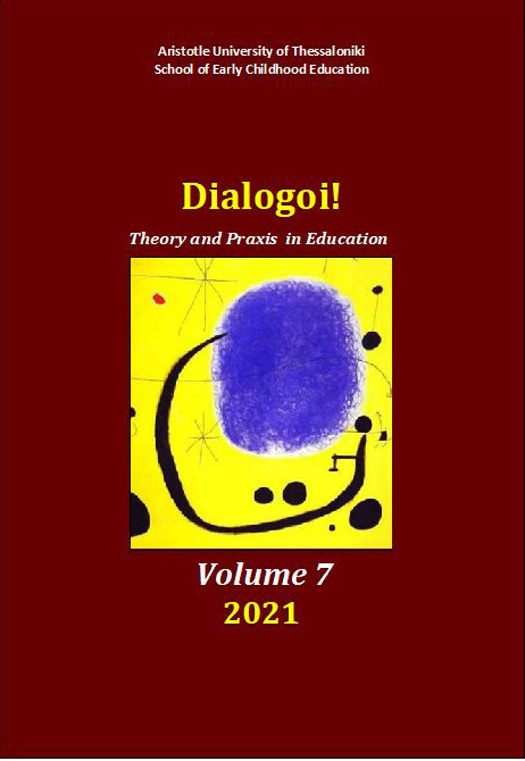Supporting, guiding and coaching preschool teachers: towards a meaningful relation between preschool teachers and their school coordinators/advisors

Published:
Nov 12, 2021
Keywords:
educational leadership guidance coaching counseling
Abstract
This paper aims to highlight the essential role of the Educational Coordinator-School Advisor in relation to the needs and expectations of preschool/kindergarten teachers. State preschool/kindergarten teachers are faced with increasingly complex and demanding roles as they have to adapt to continuous changes and implement them in their teaching. Consequently, they need support, guidance and practical suggestions form their Coordinators/ School Advisors to be more effective practitioners. Semi-structured interviews with both Coordinators/Advisors and preschool teachers were used to investigate what teachers expect from their Coordinators/Advisors and what the latter do to facilitate and support them. The results indicated that preschool/kindergarten teachers recognize the Coordinator's contribution to their everyday practice; however, it was shown that Coordinators do not always perform their duties efficiently and according to their roles, as they-themselves- often face similar challenges in their own professional field; thus, Coordinators need to make better and more extended use of their potential and optimize their practices. The findings of this study can offer fresh ideas for the reformulation of the Coordinators/Advisors’ practices and a deeper understanding of their roles regarding the quality in early childhood education and the ultimate benefit of young children.
Article Details
- How to Cite
-
Αργυροπούλου Ε., & Βερικάκη Α. (2021). Supporting, guiding and coaching preschool teachers: towards a meaningful relation between preschool teachers and their school coordinators/advisors. Dialogoi! Theory and Praxis in Education, 7, 211–230. https://doi.org/10.12681/dial.26778
- Issue
- Vol. 7 (2021)
- Section
- Scientific columns

This work is licensed under a Creative Commons Attribution-NonCommercial-ShareAlike 4.0 International License.
Authors who publish with this journal agree to the following terms:
- Authors retain copyright and grant the journal right of first publication with the work simultaneously licensed under a Creative Commons Attribution Non-Commercial License that allows others to share the work with an acknowledgement of the work's authorship and initial publication in this journal.
- Authors are able to enter into separate, additional contractual arrangements for the non-exclusive distribution of the journal's published version of the work (e.g. post it to an institutional repository or publish it in a book), with an acknowledgement of its initial publication in this journal.
- Authors are permitted and encouraged to post their work online (preferably in institutional repositories or on their website) prior to and during the submission process, as it can lead to productive exchanges, as well as earlier and greater citation of published work (See The Effect of Open Access).
Downloads
Download data is not yet available.
References
Αργυροπούλου, Ε. (2015). Προσεγγίζοντας το αβέβαιο μέλλον: Η λειτουργία του Προγραμματισμού στην εκπαίδευση. Δίσιγμα.
Αργυροπούλου, Ε. (Επιμ.). (2017). Starratt, R. - Ηθική ηγεσία στην εκπαίδευση. Δίσιγμα.
Αργυροπούλου, Ε. (2018). Οργάνωση, διοίκηση και λειτουργία της πρωτοβάθμιας εκπαίδευσης, Νηπιαγωγείο, Δημοτικό Σχολείο. Κριτική.
AlMarwani, M. (2020). Pedagogical potential of SWOT analysis: An approach to teaching critical thinking. Thinking Skills and Creativity, 38. https://doi.org/10.1016/j.tsc.2020.100741
Βασιλειάδου, Δ., & Διερωνίτου, Ε. (2014). Η εφαρμογή της μετασχηματιστικής ηγεσίας στην εκπαίδευση. Επιθεώρηση Εκπαιδευτικών-Επιστημονικών Θεμάτων, 3, 93-95.
Bernard, M. (2018). Coaching for rational living. Springer.
Βοζαΐτης, Γ. (2015). Ο ρόλος του σχολικού συμβούλου στην επαγγελματική ανάπτυξη των εκπαιδευτικών δευτεροβάθμιας εκπαίδευσης στην Ελλάδα (Αδημοσίευτη Διδακτορική Διατριβή). Πανεπιστήμιο Πατρών, Πάτρα.
Brown, C. S. (2016). A conceptual framework for coaching that supports teacher development. Journal of Education and Social Policy, 3(4), 14-25.
Carter, M., & Francis, R. (2001). Mentoring and beginning teachers. Workplace Learning. Asia/Pacific Journal of Teacher Education, 29(3), 249-262. https://doi.org/10.1080/13598660120091856
Creswell, J. (2015). Educational research. Planning, conducting and evaluating quantitative and qualitative research (5th ed.). Pearson Education.
Darling-Hammond, L., Hyler, M. E., &, Gardner, M. (2017). Effective teacher professional development. Learning Policy Institute.
Flick, U. (2014). An introduction to qualitative research. Sage.
Joyce, B., & Showers, B. (1982). The coaching of teaching. Educational Leadership, 40(1), 4-10.
Kuckartz, U. (2014). Qualitative research analysis. Sage.
Liu, F., & Wang, Y. (2019). Strengths, weaknesses, opportunities and threats analysis and countermeasures on the cultivation of preschool teachers in Sichuan province. Journal of Contemporary Education Research, 3(2). https://doi.org/10.26689/jcer.v3i2
Lloyd, C. M. (2012). Coaching as a key component in teachers professional development improving classroom practices in head start settings. OPRE Report 2012-2014, Administration for Children and Families, US Department of Health and Human Services, MD2E.
Lowenstein, M. (2005). If advising is teaching what do advisors teach? NACADA Journal, 25(2), 65-73. https://doi.org/10.12930/0271-9517-25.2.65
Νόμος 4547/12.6.2018. «Αναδιοργάνωση των δομών υποστήριξης της πρωτοβάθμιας και δευτεροβάθμιας εκπαίδευσης και άλλες διατάξεις» [ΦΕΚ 102, τεύχος Α’].
Πεζηρκιανίδης, Χ. (2020). Δημιουργία ενός θεωρητικού μοντέλου για τις φιλικές σχέσεις ενηλίκων υπό το πρίσμα της θετικής ψυχολογίας (Αδημοσίευτη Διδακτορική Διατριβή). Πάντειο Πανεπιστήμιο Κοινωνικών και Πολιτικών Επιστημών, Αθήνα.
Pierce, J., (2015). Teacher-coach alliance as a critical component of coaching. Effects of feedback and analysis on teacher practice (Doctoral Dissertation). University of Washington, Seattle.
Robson, C. (2010). Η έρευνα του πραγματικού κόσμου. Gutenberg.
Rush, D., & Shelden, I. (2011). The early childhood coaching handbook. Brooks Publishing Company.
Σταύρου, Σ. (2017). Σχολική ηγεσία και εκπαιδευτικοί οργανισμοί. 1ο Διεθνές Επιστημονικό Συνέδριο: Εκπαιδευτική ηγεσία, αποτελεσματική διοίκηση και ηθικές αξίες, τόμος Β΄ (σσ. 420-424).
Shvardak, M. (2021). S.W.O.T. analysis as a strategic management tool of the quality training of the future educational institution. Elementary Education on Line, 20(1), 958-967. http://dx.doi.org/10.17051/io.2015.85927
Solomon, B., Klein, S., & Politylo, B. (2012). The effect of performance feedback on teachers’ treatment integrity: A meta-analysis of the single-case literature. School Psychology Review, 41(2), 160-175. https://doi.org/10.1080/02796015.2012.12087518
Swinson, J., & Harrop, A. (2012). Positive psychology for teachers. A practical guide. Taylor & Francis.
van Nieuwerburgh, C., & Barr, M. (2016). Coaching in education. In T. Bachkirova, G. Spence, & D. Drake (Eds.), The SAGE handbook of coaching (pp. 505-521). Sage.
Velentin, E. K. (2001). S.W.O.T. analysis from a resource-based view. Journal of Marketing Theory and Practice, 9(2), 54-69. https://doi.org/10.1080/106966792001.1/501891


